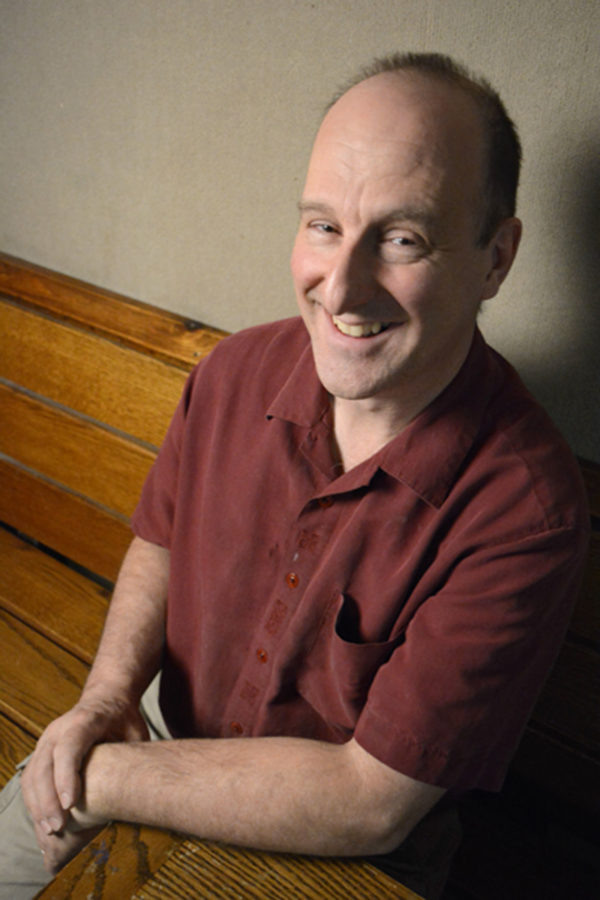The art of inspiration
Student Center Craft Shop coordinator Ron Dunkel poses for a portrait in the Big Muddy Room at the Student Center on Monday. Dunkel plans to retire in his position, which he has held since 1994.
January 26, 2015
Finding Ron Dunkel is easy.
In the basement of the Student Center is a Craft Shop that has been around for 40 years. Ask the person at the main desk if Ron is in. The answer will likely be, “Yes, check in the wood shop.”
Since 1982, Dunkel has worked and taught in the wood shop. When he’s not in the workroom, he’s elsewhere in the Craft Shop tinkering, building or creating.
Advertisement
While he may be in a predictable place, what he is doing there is hardly monotonous.
Dunkel has created everything from kayaks to picture frames. He said he has assisted countless students with projects.
But he does more than create.
“I want to inspire people here at the Craft Shop,” Dunkel said. “Inspire them to come up with ideas, inspire them with things we’ve done already.”
Dunkel’s excitement not only shapes the minds of those who visit the Craft Shop, but the shop’s physical appearance as well.
He oversaw the addition of what he calls the paint bar, which required major renovations to make space. Dunkel said the room now housing the paint bar— formerly a section of the kitchen—contained sinks, conveyor belts and huge transformers.
“Food was spilling and cockroaches were jumping all over it so they finally tore that stuff out,” Dunkel said. “We were able to take over that area for more workshops such as metal smithing, stained glass, sewing.”
Advertisement*
Kara Dunkel, Ron’s wife of nearly 30 years, describes her husband’s idea stream as never-ending.
“The man is one ball of fire of inspiration,” Kara said. “He constantly has something going on, and if he doesn’t have a project he’s working on, he’s planning to work on one.”
Dunkel’s designs are not aided by a cup of coffee, either.
“No caffeine,” he said. “I don’t need the extra energy. I’d lie awake all night, wouldn’t sleep. Too many things, too many ideas come up in my head.”
The Dunkels live on the south side of Carbondale, the same area of town Ron was raised more than 50 years ago.
Both of his parents attended SIU, and he rode his bike around campus as a child.
From birth until receiving his bachelor’s degree in art from the university, Dunkel remained in Carbondale.
This permanence has given him the opportunity to see the university grow and change.
He said he likes the way the university has adapted to catering to students more in recent years. Dunkel said as a research institution, it seemed at times students were more of an afterthought, and he appreciates the changes SIU has made.
“I like the way we roll out the carpet for the students now, and it should be more that way,” Dunkel said.
When Dunkel comes up with new plans, he said he keeps one thought in mind: What do the students need?
He has answered that question with various additions to the Craft Shop.
The sewing area of the Craft Shop was invented to help students repair broken backpacks.
Dunkel also assisted with the creation of the new bicycle Fixit stations around campus. He said transportation is a key area in which students need aid.
He has devised ways to fix and repair items students bring to him, from shoes to tools.
He plans to teach a workshop this spring on hydroponic gardening–the process of growing plants in sand, gravel or liquid– which he practices in his own greenhouse.
If Shawn Vaughn, who has worked with Dunkel for three years, had to describe him in a single word, it would be “creative.”
“The man can make anything with anything,” said Vaughn, assistant director of the Craft Shop. “He’s always looking for things he can reuse, recycle.”
Kara attests to her husband’s persistence. He built a classical guitar, which was ruined when she left their dehumidifier unplugged. The guitar’s veneer was destroyed.
Dunkel used the misfortune as a learning opportunity.
“From the whole experience, instead of getting too terribly angry with me, he learned that he had to use glues that were water insoluble,” she said.
Instruments Dunkel made afterward, including a harp for his daughter, were made with better glue. When the Dunkels’ home flooded in 2006, the instruments survived, testament to the quality of his handiwork.
“Some people, if their wife had pulled the plug and ruined a beautiful classical guitar, would throw in the towel and just be furious,” Kara said. “Not him. He decided he was going to learn from it. And I certainly learned not to pull the plug on things.”
Jonathan Swartz can be reached at [email protected]
Advertisement









Glen Alan Eichhorn • Mar 14, 2019 at 5:55 pm
Hello Ron, in California. What would have rendered 60 paintings {8 months } I have 8. Enrolled in a seniors class at Cal St. U. At Long Beach. Tried a craft class first, instilled by you, thanks. learned to paint in alcohol inks then a class in poetry. Becomes old age to grow. Glen, March 14, 2019